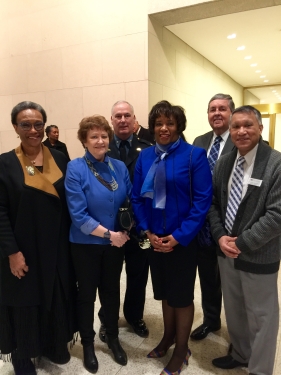
by Kelly Rogge, KCKCC
Marisa Gray did not always appreciate the value of education, even though she grew up in an environment of educators. A self-described “late bloomer,” it was not until she started experiencing life for herself that she truly began to understand that education was not only the key, but having a credential was the one thing no one could deny.
“I find great joy in empowering individuals – helping others to discover their individual strength, inner power and their own voice,” said Gray, who is the director of workforce and career development at Kansas City Kansas Community College. “Success is sometimes being in the right place, at the right time with the right skills. All you need is a crack in the window to burst through the room. It’s also not just who you know, but who knows you.”
The Black Achievers Society of Kansas City recently recognized Gray for her commitment to education and the community through a Black Achievers in Industry Award.
“Marisa’s selection exemplifies the very heart of this award,” said Susan Lindahl, chief financial officer-chief operating officer at KCKCC. “She models leadership and encourages others to strive to meet and exceed their highest goals.”
Started in 1974, the Black Achievers Society honors African Americans in business and industry. To become a member, professionals in the Kansas City area are nominated by their employer based on several criteria including accomplishments, achievements in education, leadership and community involvement. The decision then goes to a committee and each year, a new group of honorees is recognized at a dinner that is incorporated into the Martin Luther King Jr. Celebration held by the Southern Christian Leadership Conference.
“To be recognized for this award was such a humbling feeling,” Gray said. “I have great respect for this organization and for years have followed their progress. In fact, when I first moved to Kansas City in 2000, I heard about the Black Achievers and thought I would seek out more information about their membership. I learned that it was not an open membership, but based on recommendations.”
Gray said receiving the award was based on her affiliation with KCKCC. She said she has been able to make connections and participate in activities on behalf of the college, giving KCKCC a seat at the table when it comes to community issues.
“Our involvement extends far beyond education and impacts economics, health, entrepreneurship, international relations and beyond,” she said. “It is an honor and a pleasure to represent KCKCC.”
Among the society’s community activities is providing scholarships each year to high school seniors in the Kansas City area. In addition, its members also provide internships and mentoring opportunities.
“All education doesn’t happen in the classroom, but it is important that you learn something from each experience,” Gray said. “As you look to the future, it requires a very broad lens so that you can see beyond your immediate circle.”
Gray, who is working toward earning her doctorate, received a master’s of science in management from Southwestern College in Winfield, Kan., and a bachelor of general studies from Pittsburg State University in Pittsburg, Kan. She is involved with numerous community organizations including the Kansas City, Kan., Area Chamber of Commerce, the Employment Consortium, the United Way of Wyandotte County and the MidAmerica Minority Business Council.
KCKCC President Doris Givens said that Gray is one of the brightest leaders she has mentored in a doctoral internship.
“Not only is she achieving in her current role, but she also recognizes that achievement is more than a process to complete, it is a journey,” Givens said.
As the director of workforce development, Gray said it is her job to listen so she can become a bridge and connect people to the resources they need to be successful. She said it is her personal mission to help others connect the dots to position themselves to move from the bottom all the way to the top.
“It requires that one thinks of this being a ‘Yes’ world with ‘no excuses.’ You have to know yourself and believe in yourself and be intentional in your actions,” Gray said. “Now getting to ‘yes’ requires innovation, persistence and more than a willingness. There is no room for excuses, blame or shifting of responsibilities. It’s also more than working hard, but working smart.”
In addition to Gray’s recognition, KCKCC received a Corporate Award from the SCLC for its commitment to diversity at the annual Martin Luther King Jr. Day event. Gray said to receive the awards in conjunction with Martin Luther King Jr.’s birthday means a lot.
“The fight for equality, justice and respect of others still resonate for me today. Dr. King’s mission was for equality and justice in education and the workplace. He also led the fight against racism,” she said. “We have made progress on these fronts, but the battle has not been won. However, for me, that does not mean we stop working to make a difference. My father used to tell me that it is my responsibility to help somebody each day as I pass along the way. My giving back is the rent I owe for being here on earth.”
Kelly Rogge is the public information supervisor at Kansas City Kansas Community College.
